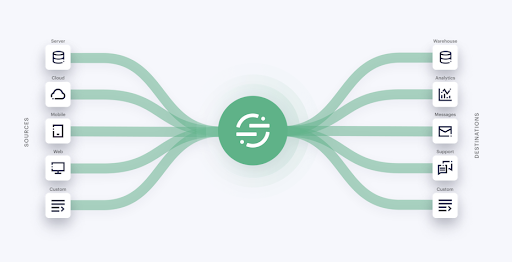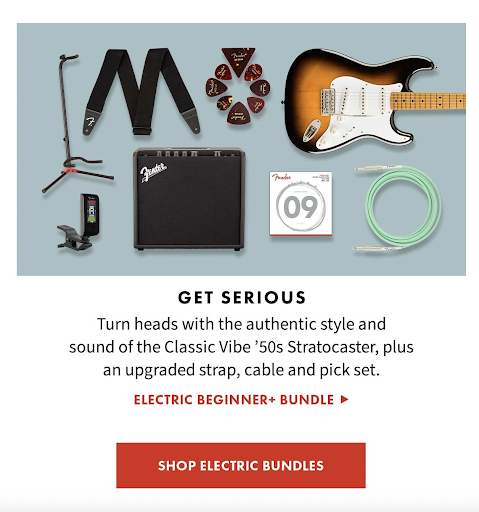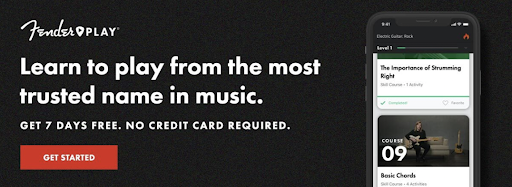Time to read: 8 minutes
The big win
Fender needed to create a single view of the customer to better understand their journey. They also wanted to improve marketing efficiency by sharing data across teams, and increase activation for Fender Play® while moving app subscribers from free to paid accounts.
Fender turned to Twilio Segment to create a single source of truth by unifying customer data. Now Fender's marketing and product teams can query events and traits with Segment’s self-service audience builder and create cohorts of users for more target messaging. And API access to user profiles enables real-time personalization across its website and mobile apps.
Founded in 1946, Fender's worldwide guitars, amps, pedals, and accessories have been played on more stages than any other company in the industry. With more than 75 years in the business, the Southern California company has established a worldwide influence that extends from the studio to the stage to the at-home consumer.
While originally designing and selling instruments and amplifiers, the company expanded into digital products with free apps such as Fender Tune®, the precision app tuner that assists users in tuning and adjusting any of their guitars, basses, and ukuleles.
Seizing an opportunity to grow its customer base and nurture the talent of budding musicians, in 2017 the company launched their subscription-based offering called Fender Play® – the complete learning app for guitar, bass, and ukulele.
Fender turned to Twilio Segment to optimize marketing efficiency, democratize data across the organization, increase app activations, and improve platform personalization and engagement.
As a result, Fender is able to:
-
Create a single customer view by consolidating and cleaning its data
-
Optimize marketing spend for greater ROI through personalization
-
Improve marketing campaign performance via cross-team data sharing
-
Increase customer lifetime value from cross-sells and upsells for Fender Play®
A single source of truth was needed to get in tune with customers
Fender knows its customers love music: the thrill of strumming a classic guitar, the pride in mastering a difficult chord, the joy in playing a favorite song. But they also needed to know their online browsing habits and purchase histories to provide the best customer experience.
Data is at the core of Fender’s customer engagement strategy. The company wanted to build a culture around data and use it responsibly. Claire Armstrong, Director of Digital Product Management, explained, “We really want to be driven by what our data is telling us so we're creating customer experiences where users feel engaged, motivated, and want to play their instrument.”
Fender uses Segment Connections to create a unified view of the customer by collecting event data from its website, mobile apps, and servers, and pulling in data from cloud apps and internal databases. Through a real-time sync of traits and audiences, that information is sent to destination applications within the Segment ecosystem like Amplitude, Iterable, and Google Analytics, where it’s accessed by internal teams.

Fixing data quality issues and schema variations was a critical step
Twilio Segment is the central hub for all of Fender’s data, which is why it sits in a key position within its data stack. Claire described their approach, “Lots of other tools do these kinds of computations, but because Segment is our source of truth, everything goes in there. It unlocked a lot of additional features that will help further personalize our apps in the future.”
But before Fender could utilize all the benefits of the customer data platform, they needed to address the inconsistent way customer information was stored in its data warehouses.
In understanding the importance of consistent naming conventions, the company carefully defines its events and corresponding properties in a data collection tracking plan using Segment Protocols. The plan serves as a central source of truth for product, marketing, engineering, analytics, and business teams.
“By checking naming violations in Segment Protocols against our tracking plan, a member of the team can be proactive about fixing data quality issues when someone has a critical event where they need to track conversions or trigger a marketing campaign,” Claire relayed.

Leading with a best-in-class tech stack
In addition to Twilio Segment, Fender uses data governance platform Avo to manage its tracking plans, which get published into Segment Protocols. Its client-side apps fire into Segment for active, QA, and production environments. Data is then sent to the various downstream destinations noted earlier. Fender’s data lake is on S3, where information is curated into Redshift and then run through Tableau and/or Alteryx for analysis.
Amplitude is the Segment integration they use most often. Designed for product, e-commerce, and marketing, it amplifies the full digital experience of the brand. “Anytime we're developing a new feature, we put together a tracking plan and decide which questions to ask of our data,” Claire noted.
Once a feature is launched the team creates charts and dashboards to prove out the answers to those questions. For example, the product team may want to know if users are clicking one lesson more than another, testing if its theories are correct.
Personalizing the customer experience with Twilio Engage
Fender uses Twilio Engage, a data-first multichannel marketing solution, to create unified customer profiles and build and activate audiences across various marketing tools. “Choosing to add on Twilio Engage was a no-brainer,” Claire said. But before Fender could send highly-targeted emails, the marketing team needed to fine-tune its data strategy.
For example, if a consumer only viewed Stratocaster® guitars when visiting the Fender website, ignoring that data and sending an email that only showed acoustic guitars would hit a sour note and miss a valuable opportunity to connect with that customer. With Twilio Segment, Fender reaches site visitors with ads that strike a chord based on user data – increasing conversion rates.
Having access to this real-time and historical customer tracking data proved instrumental. Fender saw an increase in order size after making adjustments to its web and app platforms based on user data.

Accurately identifying users is key
A secret weapon that sits at the core of Segment is Identity Resolution. It merges the history of every Fender user into a single profile so they can personalize a Fender Play® user's learning experience and display the right product to that e-commerce customer.
The powerful feature lets Fender know that Johnny B. who browsed guitars on mobile and John Brown who viewed amplifiers on its website is the same johnny.b.good86 who has liked every single image of ukuleles that Fender posted on its Instagram account.
Tracking user activity across multiple touch points ensures Fender never misses a beat. With access to consolidated customer data, creating audiences with similar user traits is easy. And it lets the marketing team tailor campaigns with product recommendations and offers that probably has some customers thinking about getting the band back together.
A data-driven approach to boosting Fender Play® subscriptions
First and foremost, Fender wanted to improve activation rates and the lifetime value of customers who use Fender Play®. They knew improved personalization would lead to increased engagement.
The learn-as-you-go app is available as a monthly or annual subscription for iOS and Android users. With step-by-step guidance, students can study at their own pace while the app tracks their progress. Each bite-size session gradually increases in difficulty, upping a student’s skill level while offering a rewarding experience. An option that provides free access without requiring a credit card opens the door to learning, while expert instructors, an impressive song catalog, and practice reminders help keep users inspired and engaged.
To increase adoption and retention rates, Fender also uses tools from Twilio Segment to optimize the customer sales funnel by streamlining the onboarding process. By firing events into Segment and looking at them in Amplitude, several customer friction points were identified. Leaning into this knowledge, they removed unnecessary steps in the sign-up process, driving a 5% increase in active paying users.

To further optimize onboarding they looked at their data collection screens and asked themselves if asking users about the instrument or type of music they wanted to play was necessary. To their surprise, most people didn’t skip that step, so they kept those data fields in and cut screens users interacted with less.
By analyzing the data, Fender found that when users set their intention upfront, identifying their ability level and the instrument and genre they’re most interested in, they were intrinsically setting themselves up for success. Users were choosing to engage in an activity they enjoyed (and would get personal satisfaction from) which made them more likely to continue practicing. Further, providing gentle nudges when needed or kudos when a milestone is reached has contributed to reduced churn (turnover) by 29%.
Taking customer data to the next level to drive app usage
Fender relies on Twilio Segment to also personalize Fender Play®. Personas captures individual user traits from all their events (past actions and behaviors) to track how many lessons a student has taken, how many songs and practice modes they’ve completed, which songs they started most often, and their highest Feedback Mode score.
Fender uses this data to populate its emails with those values for increased engagement. Claire explained, “We’ve seen a lot of success from that. It's our most opened and clicked on email, because we're able to personalize that for users with data from Twilio Segment.”
Fender also uses the data to create audiences of how engaged different users are. Less active users are prompted with a single learning activity within the Fender Play® app, while more active users receive positive reinforcement with internal “overachiever” data points and are placed in an internal "A+ student" user cohort.
Growing an e-commerce and app subscriber base
The biggest impact for Fender since implementing Twilio Segment has been the optimization of its checkout process, which increased the conversion rate on its Fender.com e-commerce website by 3%.
Using tools not previously available, they re-instrumented a number of events in Segment to gain clarity into what users were doing. This inside view into customer behavior guided their actions, prompting them to make changes in how customers interact with various form fields.
Fender relies on several key metrics to track its site effectiveness against business objectives, such as daily, weekly, and monthly active users. They also track which users come back for another day of learning in Fender Play®, how users progress through the curriculum, active paying users, and how customers browse and shop the website.
Claire explained that because different teams focus on different KPIs, “For every app, we have a team that's focused on different metrics. Those events that we're firing into Segment are telling us whether we're succeeding at driving those metrics or not.”
Fender has a new generation of musicians at its fingertips
In addition to offering innovative guitars and amplifiers, the iconic guitar brand aims to support all players on their musical journey, from beginners to professionals. After a customer brings their instrument home, Fender wants to help them learn to play.
This is where Claire sees a big opportunity. “Completing lessons, tuning your instrument, and making purchases, those milestones drive to an inflection point where we consider the user a player for life. That's a person who's going to continue to purchase many guitars throughout their lifetime, and maybe even experiment with new instruments.”
What’s next?
Investing in Twilio Segment has returned significant value to Fender. But what does the future hold? Claire has her own string theory – that increasing Fender Play® subscriptions will lead to increased sales. “We’re in the business of selling guitars, but our Fender Play® product is meant to build lifelong learners. People that are confident in playing guitar are more likely to purchase more guitars. And people who purchase guitars want to learn how to play them. We're really trying to encourage certain activities within our various apps and sites to keep driving this digital ecosystem.”
— FENDER TUNE and FENDER PLAY are trademarks of Fender Musical Instruments Corporation and/or its affiliates, registered in the U.S. and other countries.
Interested in hearing more about how Segment can help you?
Connect with the team to learn how 25,000+ companies use Segment's extensible, scalable platform to turn customer data into revenue-generating experiences.
Thank you, you’re all set!
We'll get back to you shortly. For now, you can create your workspace by clicking below.